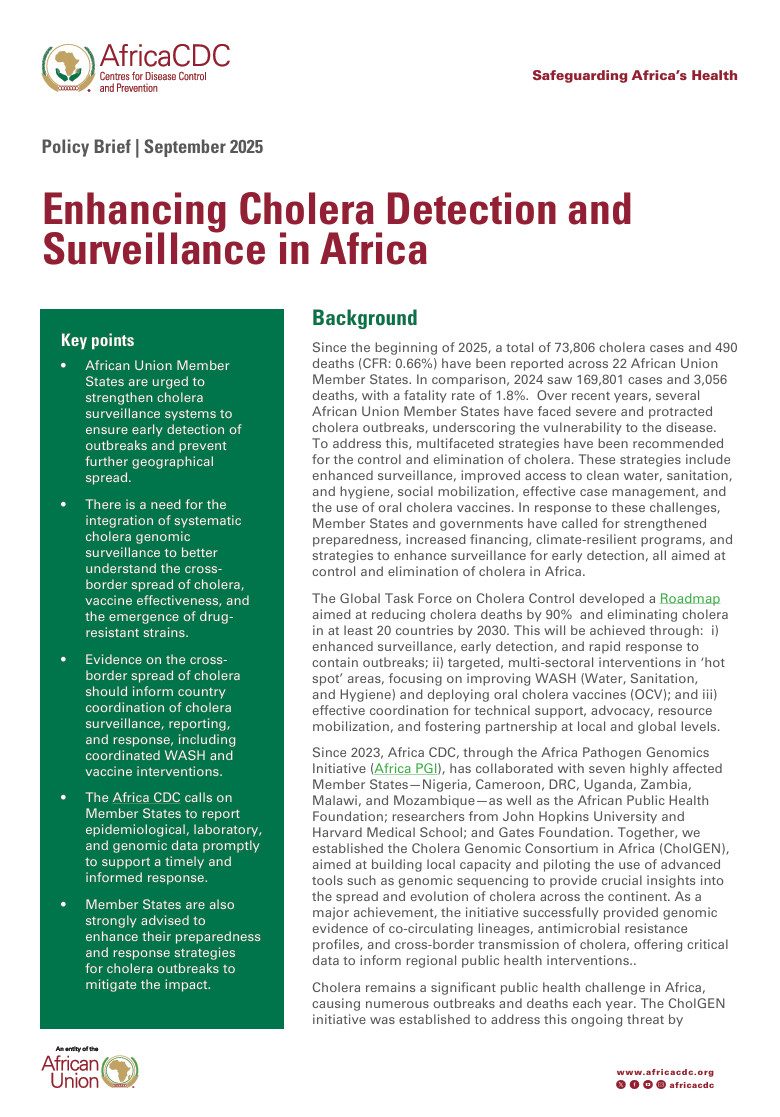How Can We Improve Cholera Detection and Surveillance in Africa?

Published: 2025-09-12 11:33:47 | Category: Uncategorized
Cholera remains a significant public health challenge across Africa, with recent statistics indicating a notable increase in cases and fatalities. Despite a decrease in case fatality rates in 2025 compared to the previous year, the continent continues to grapple with the impacts of cholera, highlighting the urgent need for effective intervention strategies. This article explores the current cholera situation in Africa, the multifaceted approaches being implemented for its control, and the collaborative efforts underway to eliminate the disease by 2030.
Last updated: 04 October 2023 (BST)
Current Cholera Situation in Africa
As of early 2025, cholera has affected 22 African Union Member States, with a total of 73,806 reported cases and 490 deaths, translating to a case fatality rate (CFR) of 0.66%. This is a stark contrast to 2024, which saw 169,801 cases and 3,056 deaths, yielding a CFR of 1.8%. These figures indicate both a concerning trend in the persistence of cholera outbreaks and some progress in reducing fatalities.
Key Takeaways
- 73,806 cholera cases reported across Africa in 2025.
- 490 deaths with a case fatality rate of 0.66%.
- Comparatively, 2024 had 169,801 cases and 3,056 deaths.
- Multi-faceted strategies recommended for cholera control.
- Collaboration with global health organisations to enhance cholera response.
Understanding Cholera: A Persistent Threat
Cholera is an acute diarrheal disease caused by the ingestion of food or water contaminated with the bacterium Vibrio cholerae. It can lead to severe dehydration and death if not treated promptly. Africa has witnessed recurring cholera outbreaks, exacerbated by factors such as poor sanitation, lack of clean drinking water, and climate-related shocks.
Strategies for Cholera Control and Elimination
To address the ongoing cholera outbreaks effectively, various strategies have been proposed and implemented across affected regions. These include:
Enhanced Surveillance and Early Detection
Strengthening surveillance systems is crucial for early detection and rapid response to cholera outbreaks. This involves:
- Establishing robust reporting mechanisms for cholera cases.
- Utilising data analytics to predict outbreaks and mobilise resources.
- Integrating cholera surveillance with other public health initiatives.
Improving Water, Sanitation, and Hygiene (WASH)
Access to safe water, adequate sanitation, and hygiene is fundamental in preventing cholera. Initiatives include:
- Investing in water infrastructure to ensure clean drinking water.
- Promoting hygiene education and practices in communities.
- Implementing community-led sanitation programmes.
Social Mobilisation and Community Engagement
Engaging communities is essential for effective cholera control. This involves:
- Raising awareness about cholera prevention and treatment.
- Encouraging community participation in health initiatives.
- Utilising local leaders to spread crucial health messages.
Effective Case Management
Timely and effective treatment of cholera cases can save lives. Key components include:
- Ensuring availability of oral rehydration solutions (ORS) and intravenous fluids.
- Training healthcare workers in cholera management.
- Developing contingency plans for rapid response during outbreaks.
Use of Oral Cholera Vaccines (OCV)
Vaccination plays a pivotal role in cholera prevention. Strategies include:
- Conducting mass vaccination campaigns in high-risk areas.
- Monitoring vaccine coverage and effectiveness.
- Integrating OCV with routine immunisation efforts.
Global Initiatives and Partnerships
The Global Task Force on Cholera Control has established a comprehensive Roadmap aimed at reducing cholera deaths by 90% and eliminating the disease in at least 20 countries by 2030. The roadmap includes targeted interventions in ‘hot spot’ areas, focusing on:
- Enhanced surveillance and rapid response mechanisms.
- Multi-sectoral interventions to improve WASH conditions.
- Coordination for technical support and resource mobilisation.
Collaborative Efforts with Africa CDC and Partners
Since 2023, the Africa CDC, in collaboration with the Africa Pathogen Genomics Initiative (Africa PGI), has partnered with several highly affected Member States, including Nigeria, Cameroon, and DRC. This partnership has led to the establishment of the Cholera Genomic Consortium in Africa (CholGEN), aimed at building local capacity and utilising genomic sequencing to understand cholera dynamics.
This initiative has achieved significant milestones, providing genomic evidence of co-circulating lineages, antimicrobial resistance profiles, and cross-border transmission patterns. Such data is critical for tailoring regional public health interventions.
Challenges Ahead
Despite the progress made, challenges remain in the fight against cholera in Africa. These include:
- Limited resources and funding for cholera control initiatives.
- Poor infrastructure affecting WASH conditions.
- Climate change impacts, leading to increased vulnerability.
Addressing these challenges requires sustained commitment from governments, international organisations, and communities to implement and support effective cholera control measures.
What Happens Next?
Looking ahead, Member States and governments are called to strengthen preparedness and increase financing for cholera interventions. This includes:
- Developing climate-resilient programmes to mitigate the impacts of environmental changes.
- Enhancing surveillance systems for early detection and rapid response.
- Mobilising resources for cholera elimination strategies.
These efforts are vital to achieving the goal of significantly reducing cholera cases and deaths by 2030.
FAQs
What is cholera and how is it transmitted?
Cholera is an infectious disease caused by the bacterium Vibrio cholerae, primarily transmitted through contaminated water and food. It leads to severe diarrhoea and dehydration, which can be fatal without treatment.
What are the symptoms of cholera?
Common symptoms of cholera include watery diarrhoea, vomiting, and leg cramps. Severe cases can lead to rapid dehydration and shock, necessitating immediate medical attention.
How can cholera outbreaks be prevented?
Preventing cholera outbreaks involves ensuring access to clean water, promoting good sanitation and hygiene practices, and vaccinating at-risk populations. Community engagement is also critical to raise awareness of prevention methods.
What role do vaccines play in cholera control?
Oral cholera vaccines (OCV) are an essential tool in controlling cholera outbreaks. They provide immunity against the disease and are particularly effective in high-risk areas during mass vaccination campaigns.
What are the challenges in fighting cholera in Africa?
Challenges in combating cholera in Africa include inadequate funding for health initiatives, poor water and sanitation infrastructure, and the effects of climate change, which can exacerbate outbreaks.
As Africa continues its fight against cholera, it is essential to remain vigilant and support robust public health measures. The collaborative efforts involving Member States, global health organisations, and local communities will be pivotal in achieving the goal of cholera elimination by 2030. #CholeraControl #PublicHealth #AfricaHealth



